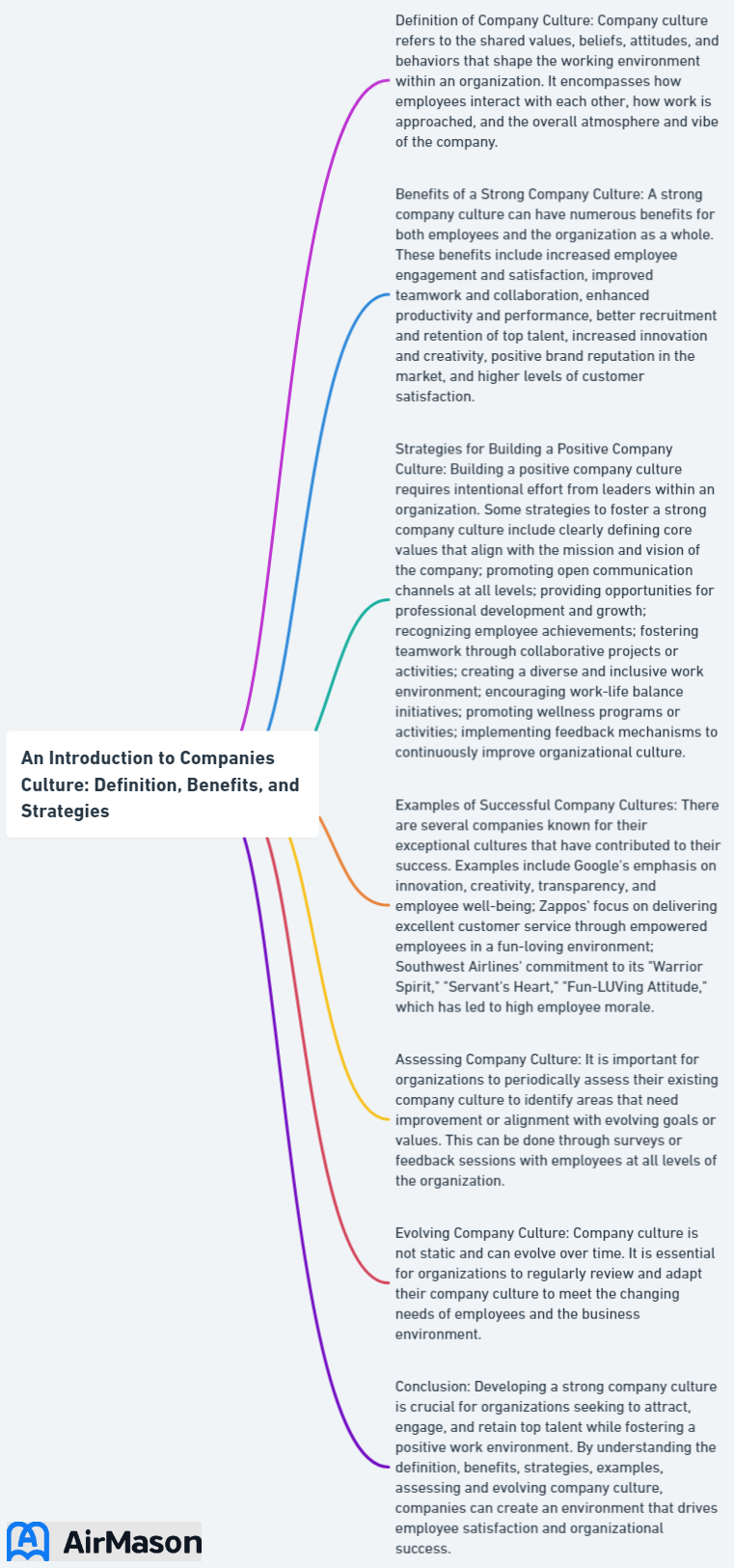
Imagine a workplace where employees are excited to come to work every day, where collaboration and innovation thrive, and where success is not just measured by financial gains but also by employee satisfaction and well-being. This is the power of a strong companies culture. So, what does it take to create such an environment, and why is companies culture so important? In this blog post, we will delve into the intricacies of companies culture, its benefits, and strategies for building a culture that fosters success.
Key Takeaways
- Create a positive company culture to attract top talent and drive business success.
- Align values, foster open communication, recognize achievements and promote diversity & inclusion for improved employee engagement.
- Real world examples of strong cultures show investing in culture can lead to increased productivity & profitability.
Understanding Company Culture
Company culture is the collective values, attitudes, and practices that shape an organization’s work environment and influence employee behavior. It is the secret sauce that makes a company unique and sets it apart from competitors. Achieving success often hinges on a strong company culture, given its direct influence on employee morale, productivity, and retention. That’s why culture is important for businesses, and investing in it pays dividends in the long run.
The establishment of a positive company culture hinges on elements like:
- Teamwork
- Collaboration
- Consistent communication of company values
- Employee recognition
- Work-life balance promotion
All of these elements are vital for success and need the buy-in of all employees. Doing so will result in improved employee engagement, retention, and productivity.

Defining Company Culture
Company culture, also known as a company’s culture, is the shared ethos of an organization, encompassing its values, attitudes, practices, environment, policies, and employee behavior. Laying the foundation for a successful company culture originates from defining a unique set of values. Incorporating values such as:
- sustainability
- respect
- transparency
- kindness
- equality
- innovation
- integrity
- honesty
- fairness
Fostering a vibrant company culture can help attract top talent.
Active incorporation of company values into policies, practices, and employee behavior can reflect these principles in our organization’s culture. This alignment of values and actions fosters a strong foundation for the company culture, which in turn, positively impacts business success.
The Four Types of Organizational Culture
Organizational culture can be categorized into four types based on shared values, attitudes, and practices, each with its own strengths and weaknesses. Hierarchy culture is a traditional, risk-averse work environment that values well-defined processes, stability, and uniformity to ensure success, including providing excellent customer service. Market culture, on the other hand, is a results-oriented work environment that emphasizes external success and maximizes the bottom line, rewarding team members for meeting quotas, reaching targets, and achieving results.
Every individual is valued in a clan culture, and communication is emphasized. This helps create an environment that is focused on people and encourages collaboration. Lastly, the adhocracy culture is one that values innovation, flexibility, and adaptability, promoting a work environment that encourages risk-taking and creativity. Understanding these different types of organizational culture can help businesses tailor their approach to creating a culture that best suits their goals and values.
An Organization’s Culture
An organization’s culture encompasses the shared values, beliefs, and behaviors that define its identity and guide its interactions. It serves as the backbone of any entity, shaping the way employees collaborate, make decisions, and approach challenges. The vitality of an organization’s culture cannot be overstated, as it influences employee morale, productivity, and overall performance. Furthermore, a healthy and inclusive culture fosters a sense of belonging and purpose among team members, ultimately leading to higher retention rates and attracting top talent. When an organization invests in nurturing a positive culture, it not only enhances its internal dynamics but also projects a strong and appealing image to external stakeholders, including clients, partners, and the broader community. Thus, understanding, cultivating, and continuously refining an organization’s culture is paramount for long-term success and sustainability.
The Importance of Company Culture
The crucial role of a strong company culture in business success is evident in its impact on employee satisfaction, productivity, and retention. By prioritizing workplace culture, businesses can better prepare for tough times and changes in the business environment, enabling them to come out on top. Company culture can be the key to having a satisfied, motivated employee who is productive and highly engaged.
The role of an organization’s culture, often referred to as organizational culture, is influential in determining business success. It can help your business remain competitive, attract high-caliber personnel, spur innovation in product and services, and foster a conducive working environment where collaboration is encouraged. A good company culture creates an environment where employees feel secure, listened to, valued, and inspired to give their all to their work.
Benefits of a Strong Company Culture

A strong company culture can be a catalyst for increased employee engagement, innovation, profitability, and reduced recruitment costs and turnover. Leadership can greatly influence company culture by setting an example and promoting desired values and behaviors. Respect is an essential element that can have a tremendous impact on employees’ perception of a company’s culture, with its importance being 18 times greater than any other factor. Make sure to foster a culture of respect to enhance your company’s culture.
Recognizing and rewarding employees’ hard work and dedication is a surefire way to increase morale and inspire them to keep striving for excellence, making company culture important for overall success. Some ways to foster a positive company culture include:
- Providing growth and development opportunities
- Encouraging a culture of learning, development, and continuous improvement
- Recognizing and rewarding employees for their achievements
- Promoting open communication and collaboration
- Creating a supportive and inclusive work environment
By implementing these strategies, organizations can create a culture that values and supports its employees, leading to increased job satisfaction and reduced turnover – ultimately benefitting every employee and the organization.
Challenges of Poor Company Culture
Serious repercussions like increased employee turnover, decreased morale and productivity, and challenges in attracting top talent can stem from a weak or toxic company culture. Implementing best practices can help improve company culture and avoid these negative outcomes.
The relationship between company culture and employee morale is significant. A positive and healthy company culture can significantly elevate employee morale, leading to greater job satisfaction, engagement, and productivity. Conversely, a poor or negative company culture can have a damaging effect on employee morale, resulting in decreased job satisfaction, disengagement, and productivity.
Building a Positive Company Culture

The creation of a strong company culture is dependent on alignment of company values, effective leadership, and cultivation of employee engagement. It is essential to involve every employee in the process, as teamwork and collaboration are key factors in building a positive company culture. Providing clear performance expectations helps employees understand what’s expected of them and reinforces the culture we strive to create.
Empowering employees with the freedom to make decisions and take action in their work can have a profoundly positive effect on workplace culture. Involving employees in decision-making can help build employee trust and establish an atmosphere of openness within the organization, ultimately fostering a positive organization’s culture.
Aligning Company Values
A clear mission, vision, and set of values serve as the cornerstone for building a robust company culture. Incorporating values such as:
- Sustainability
- Respect
- Transparency
- Kindness
- Equality
- Innovation
- Integrity
- Honesty
- Fairness
can help create a vibrant company culture.
To create an impactful company culture that resonates with employees, it’s crucial to weave company values into everyday activities. This alignment of values and actions fosters a strong foundation for the company culture, which in turn, positively impacts business success.
Leadership’s Role in Shaping Culture
Leaders stand at the forefront of shaping company culture, as they personify company values and set the standard for behavior and work ethics. Through their actions and reactions, they can create and reinforce workplace norms that drive a positive culture and influence company culture.
Effective leadership is pivotal in advancing diversity and inclusion. Inclusive leadership encourages individuals to share their unique perspectives, leading to a more diverse range of ideas. Diverse leadership increases retention, draws talented individuals, and fosters a positive culture. Leadership should clearly explain how diversity, equity, and inclusion (DEI) will benefit the organization, such as:
- Enhancing the ability to relate to a wider range of customers
- Increasing innovation and creativity
- Improving decision-making by considering different perspectives
- Building a stronger reputation and brand image
- Creating a more inclusive and welcoming work environment
Encouraging Employee Engagement
For a positive work environment to thrive, it’s critical to engage employees in the development and upkeep of the company culture. Employee engagement can play a key role in strengthening the company culture by creating a positive and productive work environment. Engaged employees are more likely to:
- Feel a sense of commitment, motivation, and satisfaction with their work
- Feel valued and empowered to take ownership and control of their roles
- Improve productivity
- Have higher employee retention rates
- Foster a stronger sense of collaboration and teamwork
Ultimately, employee engagement helps to build a culture of trust, loyalty, and success within the company.
Effective strategies for nurturing employee engagement and establishing a successful company culture include:
- Fostering open communication
- Recognizing employee achievements
- Advocating for diversity and inclusion
- Providing ample growth and development opportunities
Environment for Work
The environment for work plays a pivotal role in shaping productivity and overall well-being in any professional setting. It encompasses not only the physical workspace but also the cultural, social, and psychological factors that influence one’s work experience. A conducive work environment is characterized by elements such as ergonomic furniture, ample natural light, and minimal noise disruptions, all of which contribute to enhanced focus and efficiency. Moreover, a supportive and inclusive work culture fosters collaboration, creativity, and a sense of belonging among team members. Striking a balance between open collaborative spaces and private areas for concentrated work is essential in creating a versatile environment that accommodates different work styles. Additionally, incorporating elements of nature, like indoor plants or access to outdoor spaces, can have a positive impact on mental well-being and overall job satisfaction. In essence, a thoughtfully designed and harmonious environment for work is a cornerstone in enabling individuals to thrive professionally.
Strategies for Improving Company Culture

The enhancement of company culture can be achieved through the implementation of various strategies such as promoting open communication, acknowledging employee achievements, and advocating for diversity and inclusion. These strategies contribute to enhancing our company culture by providing opportunities for employees to connect and build relationships, helping employees advance their careers and providing growth opportunities, making transparency a priority, fostering trust and open communication, establishing a strong code of ethics, and promoting inclusive hiring processes.
Great strides in improving our company culture, paving the way for a more positive, engaged, and successful workforce, can be made by putting these strategies and best practices into action.
Fostering Open Communication
Trust and improved employee morale within the organization can be fostered through the promotion of open and transparent communication. Open communication can boost employee morale through:
- Increased engagement
- Improved job satisfaction
- Enhanced teamwork and collaboration
- Increased trust and loyalty
- Improved problem-solving and decision-making
Transparent decision-making builds employee trust and encourages openness within the organization, reflecting the company’s values and fostering a positive company culture. By involving employees in decisions that may affect them as well as the business and being transparent in explaining why those decisions were made, we can create transparent decision-making, which is important for a strong company culture.
Recognizing Employee Achievements
Morale and performance can receive a significant boost when employee contributions are regularly recognized and rewarded, ensuring alignment with core values and fairness. Strategies to create a positive and rewarding work environment include:
- Acknowledging achievements
- Social recognition
- Employee appreciation programs
- Rewards and incentives
- Regular feedback and communication
Implementing these strategies can help to create a positive and rewarding work environment.
Recognizing and rewarding employees’ hard work and dedication is a surefire way to increase morale and inspire them to keep striving for excellence, making company culture important for overall success. Some ways to foster a positive company culture include:
- Providing growth and development opportunities
- Encouraging a culture of learning, development, and continuous improvement
- Recognizing and rewarding employees for their achievements
- Promoting open communication and collaboration
- Creating a supportive and inclusive work environment
By implementing these strategies, you can create a culture that values and supports your employees, leading to increased job satisfaction and reduced turnover – ultimately benefitting every employee and the organization.
Promoting Diversity and Inclusion
A strong company culture that values differences and fosters a sense of belonging can be established through the embrace of diversity and cultivation of an inclusive work environment. By fostering an inclusive culture, you can:
- Create a sense of belonging for your employees
- Increase engagement
- Improve productivity
- Foster loyalty
We can foster diversity and inclusion in the workplace by:
- Implementing robust mentorship programs
- Creating an inclusive culture
- Providing training and education
- Establishing goals and metrics
- Encouraging open communication
- Offering flexible work arrangements
- Celebrating diverse perspectives
- Ensuring equal opportunities
- Supporting employee resource groups
- Regularly reviewing policies and practices.
Measuring and Evaluating Company Culture

Regular assessment of company culture can pinpoint areas for improvement and verify the alignment with our organizational goals. The most effective tools and methods for evaluating company culture include:
- Pulse checks
- Culture assessment tools
- Employee surveys
- Focus groups
- The Organizational Culture Assessment Instrument (OCAI)
These methods provide invaluable insights into the company’s culture and help uncover areas for growth and alignment to maximize success.
The evaluation of company culture success can leverage various methods such as:
- Surveys
- KPIs
- Third-party culture measurement tools
- Focus groups
- Exit surveys
- Organizational culture assessments
- eNPS
These tools can assist in identifying both areas of success and those needing improvement.
Tools and Methods for Evaluating Culture
Valuable insights into the strengths and weaknesses of company culture can be gleaned through various tools and methods, including employee surveys and culture committees. Culture committees are an invaluable part of the organization, as they are responsible for promoting a positive company culture, ensuring that it is aligned with the organization’s values, and driving cultural initiatives from within the organization.
Focus groups can be used as a powerful tool to evaluate company culture by conducting guided discussions with employees to gather their valuable opinions, feedback, and perceptions about the company culture. This qualitative data can provide valuable insights into the strengths, weaknesses, and areas for improvement in the company’s culture. Focus groups can be used in conjunction with employee surveys to supplement the quantitative data with more in-depth and nuanced insights.
Identifying Areas for Improvement
A stronger workplace can be built by organizations that make meaningful changes, which can be guided by invaluable insights into areas needing improvement gained through company culture evaluation. Making necessary changes to strengthen company culture is essential for our organization’s success and competitiveness. It also helps to:
- Create a positive work environment
- Foster employee engagement
- Improve employee satisfaction
- Increase productivity
- Enhance teamwork and collaboration
These are key components of building a strong and successful business.
By regularly assessing company culture and implementing best practices, we can ensure continuous improvement and alignment with our organizational goals, ultimately leading to a more positive, engaged, and successful workforce.
Fostering Team Culture
Fostering team culture is essential for creating a cohesive and productive work environment. It involves cultivating a shared set of values, beliefs, and behaviors that guide how team members interact and collaborate. This process begins with clear communication of the organization’s mission and vision, ensuring that every team member understands their role in achieving common goals. Regular team-building activities and open discussions help reinforce this sense of unity. Furthermore, recognizing and celebrating individual and collective achievements can boost morale and reinforce the positive aspects of the team culture. It’s also important to encourage feedback and actively address any conflicts or concerns, creating a safe space for open dialogue. By prioritizing the development of a strong team culture, organizations can not only enhance productivity but also foster a sense of belonging and loyalty among their members.
Real-World Examples of Strong Company Cultures

The benefits of prioritizing culture, as demonstrated by companies with strong organizational cultures like Microsoft and Salesforce, are evident in terms of employee satisfaction, productivity, and overall business success. These companies have shown that investing in culture pays dividends, leading to increased engagement, innovation, and a competitive edge in the market.
By learning from these real-world examples, we can apply the lessons and strategies they have used to create strong company cultures within our own organizations. With a focus on aligning values, effective leadership, and fostering employee engagement, we too can unlock the enormous potential of a strong company culture and propel our businesses to new heights.
Summary
In conclusion, building a strong company culture is essential for business success. It impacts employee satisfaction, productivity, and retention, ultimately leading to a more positive, engaged, and successful workforce. By aligning company values, effective leadership, and fostering employee engagement, we can create a thriving company culture that drives success. Remember, a strong company culture is not just a luxury – it’s a necessity for organizations that want to excel in today’s competitive business environment.
Frequently Asked Questions
What is company culture examples?
Employee recognition, mentorship programs, mental health support, and social justice initiatives, as well as a company’s dress code, office layout, perks program and social calendar are all examples of how to create an inspiring company culture. Check out Best WorkplacesTM for more examples.
What is the culture of a company?
Company culture is the shared values, attitudes, behaviors and standards that make up a work environment. It is reflected in the way people think, say and do as they work together, creating an experience for employees and customers that is in line with the external brand and messaging of the organization.
What are the 4 common types of company culture?
Company culture comes in many different forms, including adhocracy, clan, hierarchy, and market. Adhocracy is focused on change, risk, and innovation; clan cultures are team-oriented and action-oriented; hierarchy values structure and formal rules; and market cultures focus on competition and measuring performance.
Why is company culture important?
Company culture is essential for business success, as it drives employee satisfaction, productivity and retention, resulting in a more engaged and successful workforce.
How can we create a positive company culture?
Encouraging open communication, recognizing employees’ accomplishments, and setting common company goals are key to establishing a positive company culture that promotes growth and success.